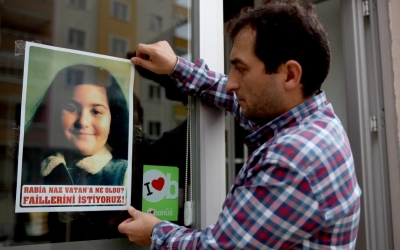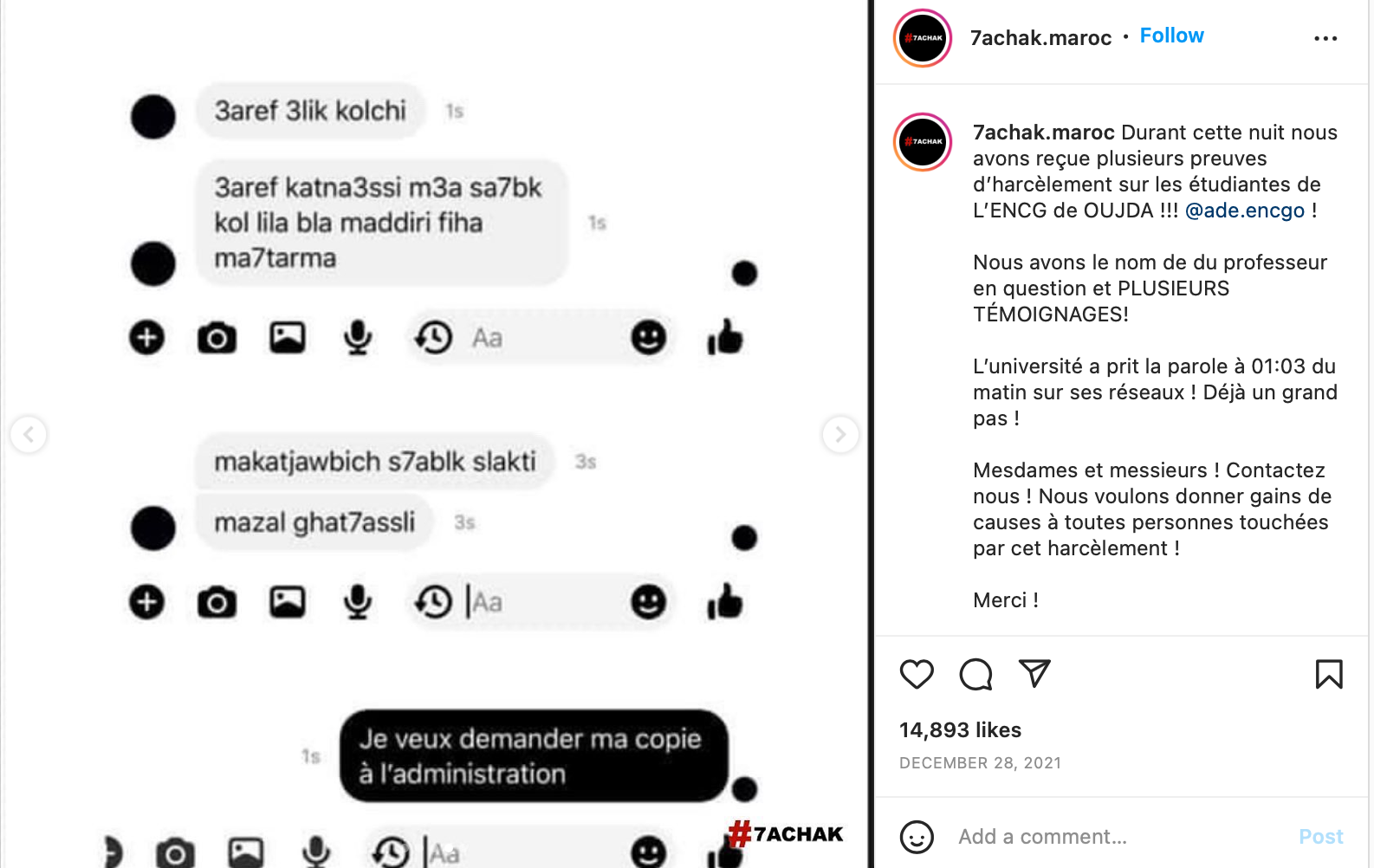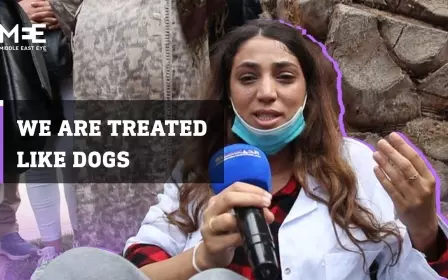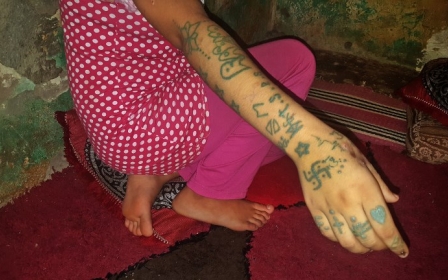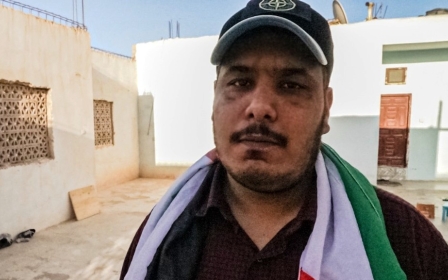Morocco: Women students break their silence on 'sex for grades' scandal

In what is being referred to as the beginning of a Me Too moment in Morocco, women students are breaking their silence on social media to discuss instances of sexual violence in academic institutions, following a scandal involving professors demanding sexual favours in exchange for academic appraisal at universities.
Nadia, 24, said she was subjected to "sexual blackmail" by one of her professors, and talked about how it had taken her a long time to be able to speak about what had happened to her. While the subject remains taboo in the relatively conservative North African kingdom, Nadia believes she was a "victim" of her silence.
"I am no longer that person. I am not attempting to sway the judiciary; rather, I am attempting to convey to any other victim the importance of speaking up," she told AFP.
'I am attempting to convey to any other victim the importance of speaking up'
- Nadia, victim of sexual blackmail
Her case is similar to that of numerous others in Morocco. She was "expelled from university" for "refusing to submit to sexual blackmail" by one of her professors.
In a press conference with members of women's rights organisations on the subject of sexual assault against Moroccan women in universities, a student at Settat's Faculty of Law said that, despite her experience with sexual blackmail earlier this year, she was unable to approach the judiciary, as is the case with the majority of victims of sexual assault in Morocco.
New MEE newsletter: Jerusalem Dispatch
Sign up to get the latest insights and analysis on Israel-Palestine, alongside Turkey Unpacked and other MEE newsletters
However, everything changed months later, in September of last year, when local media published WhatsApp conversations in which female students accused university professors of harassing and blackmailing them in exchange for academic leniency.
The leaked conversations on Instagram included messages "drenched in pornography" in which the student, who is alleged to have been the victim of blackmail, expressed gratitude to the professor for his assistance.
The two parties then discussed how she and her female colleagues would be compensated for their assistance, which organisations described as "nothing more than a sexual relationship".
After one year, the Hassan I University, where Nadia was eventually re-admitted, finds itself embroiled in a scandal involving five professors, all of whom are accused of demanding "secret sexual favours" in exchange for good grades.
While one of the professors was sentenced to two years in prison earlier this month, the other four appeared in court on Monday.
Anti-harassment law
These are the first cases of their kind, following the passage of a law in 2018 that imposed the first-ever prison sentences for "harassment, assault, sexual exploitation, or abuse".
The legislation was introduced in response to a viral video of a 24-year-old woman having her clothes torn off on a bus, sparking protests.
Known locally as the Hakkaoui law, the bill was criticised for not going “far enough in fostering equality for women in Morocco”, as it does not define domestic violence in specific and certain terms, does not definitively ban marital rape or spouse abuse and does not do “enough to account for supporting victims and survivors”.
Almost five years after lawmakers in the country first introduced the measure to prohibit violence against women, Moroccan women are now witnessing its gradual implementation.
To take things further, the #MeTooUniv hashtag has sparked accusations against educators throughout Morocco by advocating a social media initiative that would allow women to anonymously upload their testimonies and evidence, as well as report any questionable behaviour.
“What happened to me is not an isolated incident,” Nadia said. "Other girls have endured similar ordeals, but no one listened to us."
Women who have been victims of harassment have been invited to share their stories on Instagram pages like "7achak" - a local dialect expression used to excuse oneself before broaching a taboo subject.
Sarah Benmoussa, an administrator and activist specialising in defending women's rights, said she had received more than 30 testimonies "with evidence from female students in several cities, as well as women who graduated some time ago... and this is just the beginning".
This watershed moment sparked the submission of numerous female students' testimonies online, quickly demonstrating the magnitude of the problem that has "plagued the country".
As the frequency of women reporting cases continues to grow, one teacher at a higher education institution in Casablanca faces nearly 100 allegations of attempted rape, sexual blackmail, and abuse of power.
Similarly, the publication of a WhatsApp conversation between a student and an assistant professor at the National School of Commerce and Management in Oujda, in which the student asked the assistant professor to "validate some tests" and the teacher demanded a "fellation ssession" in exchange, prompted dozens of university students to demonstrate in late December, demanding the professor's dismissal.
The professor had reminded students that he had the “administration is in his pocket” and “that there is no point in going to tell them”, before concluding: “You are trapped now.”
Following widespread public pressure, the higher education ministry appointed an investigative committee, which recently revealed the professor's "involvement" in the blackmailing and harassment of female students at the institution.
"I am writing to urge you to put an end to the sexual harassment and heinous and unacceptable acts committed by a monster posing as an instructor," a former university student wrote on the 7achak Instagram page.
Within a week of his arrest and the dismissal of several "complicit" officials, the ministry launched an investigation into allegations against other professors, including the prosecution and imprisonment of another university professor at Tangiers' King Fahd School of Translation in early January.
According to lawyer Aicha Guella, nearly 70 complaints have been lodged at Abdelmalek Essaadi University in Tetouan, but have received no response from the university's administration.
What has become known in the media and among students as "sex for grades" sparked outrage among activists, online and in Moroccan local media.
Translatation: These criminal practices on the part of teachers in Moroccan schools and universities are extremely widespread. Many young women dropped out of school and found themselves devastated as a result. Until when?
Others discussed the hypocrisy of dominant discourses on sexual assault in Moroccan society, arguing against ideas that place the blame on students for accepting services to improve their grades.
Translatation: So when we accept compensation we are no longer victims?
Parliamentarian Qoulb Fetab, of the Authenticity and Modernity party, said that "not a day goes by without a new case of sexual harassment of female students being raised in universities, schools, and higher institutions."
She added that many women university students face "a variety of forms of violence, threats, and coercion," casting doubt on the system in place to protect female students from these forms of gender-based violence.
As pressure mounted on state officials to address the issue, Higher Education Minister Abdellatif Miraoui committed to a "zero tolerance" policy for sexual harassment, as well as the establishment of a toll-free hotline at several universities and the formation of specialised teams to investigate cases of sexual violence.
Middle East Eye delivers independent and unrivalled coverage and analysis of the Middle East, North Africa and beyond. To learn more about republishing this content and the associated fees, please fill out this form. More about MEE can be found here.


